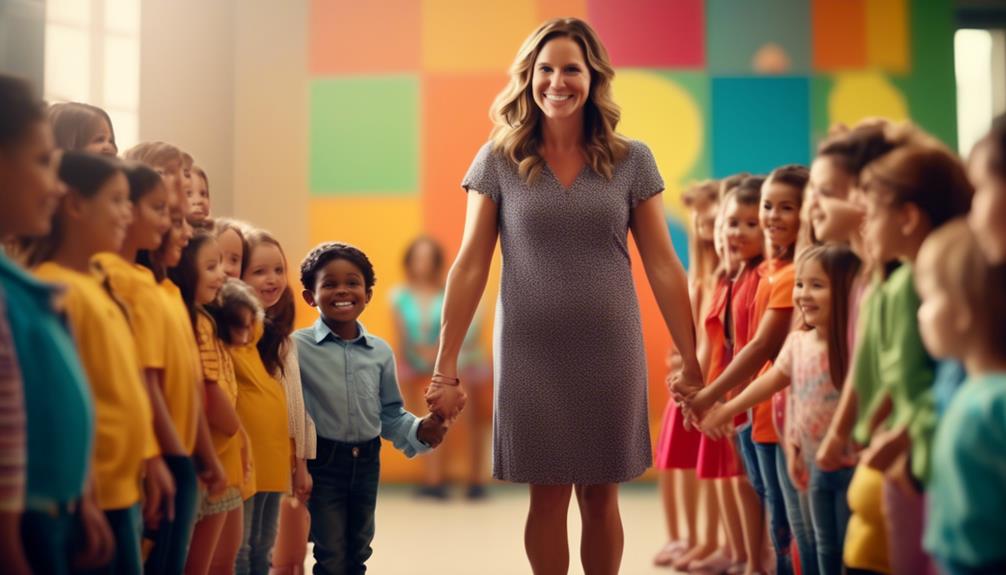Supporting the Transition From Preschool to Kindergarten

Practical strategies and insights to support a smooth transition from preschool to kindergarten:
- Start preparing for the transition early: Talk to your child about kindergarten and what to expect. Visit the school together and attend any orientation or open house events.
- Establish a routine: Help your child adjust to the new kindergarten schedule by gradually implementing a similar routine at home. This can include specific times for meals, naps, and bedtime.
- Encourage independence: Foster your child's independence by encouraging them to do things on their own, such as dressing themselves, using the bathroom independently, and taking responsibility for their belongings.
- Develop social skills: Help your child develop social skills by arranging playdates with other children who will be attending the same kindergarten. Practice sharing, taking turns, and resolving conflicts peacefully.
- Foster a love for learning: Encourage your child's curiosity and love for learning by reading together, engaging in educational activities, and providing opportunities for hands-on exploration and discovery.
- Communicate with the teacher: Establish a positive and open line of communication with your child's kindergarten teacher. Attend parent-teacher meetings, ask questions, and share any concerns or important information about your child.
- Provide emotional support: Be there for your child emotionally during this transition. Validate their feelings, reassure them that it's normal to feel nervous, and offer comfort and encouragement.
Empower your child to thrive in their new environment:
- Build self-confidence: Encourage your child to take on new challenges and celebrate their achievements. Help them discover their strengths and talents and remind them of their capabilities.
- Teach problem-solving skills: Equip your child with problem-solving skills by allowing them to find solutions to small challenges on their own. Encourage them to think critically and come up with creative solutions.
- Foster a growth mindset: Teach your child the power of a growth mindset, emphasizing that effort and perseverance lead to growth and success. Encourage them to embrace challenges and view setbacks as opportunities to learn and improve.
- Promote a healthy lifestyle: Ensure your child gets enough sleep, eats nutritious meals, and engages in regular physical activity. A healthy body supports a healthy mind, enabling them to focus and thrive in their new environment.
- Encourage involvement in school activities: Encourage your child to participate in school activities, such as joining clubs, sports teams, or after-school programs. This will help them make new friends and develop additional skills and interests.
By implementing these strategies and empowering your child, you can help ensure a smooth transition to kindergarten and set them up for success in their new environment.
Key Takeaways
- Start early and establish routines to prepare for the transition to kindergarten.
- Communicate and provide emotional support to your child during this time.
- Promote a healthy lifestyle by ensuring enough sleep, nutritious meals, physical activity, and mental well-being.
- Familiarize your child with the kindergarten environment through school visits and introductions to the teacher.
Preparing Your Child Emotionally
Preparing your child emotionally for the transition from preschool to kindergarten can greatly contribute to a smooth and successful start to their academic journey. As a parent, your emotional support and involvement play a crucial role in helping your child navigate this significant change.
First and foremost, it's important to acknowledge and validate your child's emotions. Starting kindergarten can be overwhelming for them, filled with excitement and apprehension. Take the time to have open conversations about their feelings and reassure them that it's normal to have mixed emotions. Let them know that you're there to support them every step of the way.
In addition to emotional support, parent involvement is key during this transition. Attend orientation sessions and meet with your child's teacher to understand the routines and expectations of kindergarten. This won't only give you peace of mind but will also enable you to better prepare your child for what lies ahead.
Create a positive and consistent routine at home that mirrors the structure of the kindergarten classroom. This will help your child feel more comfortable with the transition and provide them with a sense of security.
Lastly, encourage your child's independence by gradually transitioning them into new responsibilities. Allow them to make decisions and problem-solve on their own, while providing guidance when needed. This will boost their self-confidence and prepare them for the increased independence expected in kindergarten.
Establishing a Familiar Routine
To ensure a smooth transition from preschool to kindergarten, establishing a familiar routine for your child is essential. By creating a structured daily schedule, you provide your child with a sense of stability and predictability, which can help ease any anxiety or uncertainty they may be feeling. Here are three key steps to help you establish a familiar routine:
- Set a consistent wake-up and bedtime: Having a regular sleep schedule is crucial for your child's overall well-being. Ensure they get enough rest by setting a consistent wake-up and bedtime. This will help them feel refreshed and ready to tackle each day.
- Plan regular meal and snack times: Establishing regular meal and snack times not only ensures your child receives proper nutrition but also helps them develop healthy eating habits. Make mealtime a family affair, creating a comforting environment where they can enjoy their food and engage in meaningful conversations.
- Allocate time for play and learning: Incorporate dedicated time for both play and learning in your child's daily routine. This balance is important for their development and growth. Encourage imaginative play, provide opportunities for physical activity, and allocate time for reading, writing, and other educational activities.
Familiarizing Your Child With the Kindergarten Environment
Now that your child is entering kindergarten, it's important to familiarize them with the new environment. One way to do this is by scheduling school visits and tours, allowing your child to see the classrooms, playground, and other areas they'll be spending their time in.
Additionally, make an effort to introduce your child to their kindergarten teacher before the school year begins, as this can help ease any anxieties and build a sense of familiarity.
School Visits and Tours
Familiarize your child with the kindergarten environment by taking them on school visits and tours, allowing them to become acquainted with their future learning space. These visits and tours serve as an excellent opportunity for both you and your child to familiarize yourselves with the school policies and get a sense of the school's culture.
Here are three key benefits of school visits and tours:
- Orientation: School visits and tours provide an orientation to the kindergarten environment, helping your child navigate the classrooms, playgrounds, and other facilities. This familiarity can alleviate any anxiety your child may have about starting kindergarten.
- Meeting Teachers: During these visits, you and your child can meet the teachers and staff members who'll be guiding your child's educational journey. Building a rapport with them beforehand can foster a sense of comfort and trust.
- Parent Involvement: School visits and tours also allow you to gauge the level of parent involvement in the kindergarten community. It provides an opportunity to meet other parents and establish connections, fostering a supportive network.
Meeting the Kindergarten Teacher
As you continue preparing your child for kindergarten, an important step is getting to know their future teacher and becoming familiar with the kindergarten environment. Meeting the kindergarten teacher is a great opportunity for both you and your child to establish a connection and gather important information.
Many schools organize open houses or meet-the-teacher events before the start of the school year. These events provide an opportunity for you to meet other parents as well. It's a chance to ask questions, learn about the curriculum, and understand the expectations of the kindergarten program.
Meeting the parents of your child's future classmates can also help foster a sense of community and support. Take advantage of this time to build relationships and set the stage for a successful transition to kindergarten.
Encouraging Independence and Self-Help Skills
Are you ready to empower your child with the skills they need to succeed in kindergarten?
Building self-care routines and fostering problem-solving skills are key to encouraging independence and self-help skills.
By establishing daily routines for tasks like dressing, eating, and toileting, you can teach your child the importance of taking care of themselves.
Additionally, providing opportunities for them to solve problems on their own helps build their confidence and resilience.
Building Self-Care Routines
Encourage your child's independence and self-help skills by establishing consistent self-care routines that promote confidence and responsibility. Developing healthy habits at an early age is crucial for your child's overall well-being. By incorporating these routines into their daily life, you can help them cultivate a sense of independence and self-confidence.
- Morning Routine: Create a structured morning routine that includes tasks such as getting dressed, brushing teeth, and having a healthy breakfast. This will teach your child the importance of starting the day on a positive note and instill a sense of responsibility.
- Mealtime Routine: Establish a regular mealtime routine that involves setting the table, serving themselves, and cleaning up afterward. Encourage your child to make healthy food choices and teach them basic table manners.
- Bedtime Routine: Establish a calming bedtime routine that includes tasks like bathing, changing into pajamas, and reading a bedtime story. This will help your child wind down and prepare for a restful night's sleep.
Fostering Problem-Solving Skills
Building self-care routines is just the beginning of fostering problem-solving skills and encouraging independence and self-help skills in your child. As they transition from preschool to kindergarten, it is important to provide them with opportunities to develop problem-solving strategies and creative thinking techniques. By doing so, you are equipping them with essential tools that will serve them throughout their lives.
To support your child in this process, consider incorporating the following strategies into their daily routines:
| Problem-Solving Strategies | Creative Thinking Techniques |
|---|---|
| Encourage trial and error | Stimulate curiosity |
| Teach decision-making skills | Foster imagination |
| Promote critical thinking | Emphasize open-mindedness |
| Provide opportunities for collaboration | Explore different perspectives |
| Celebrate perseverance and resilience | Encourage brainstorming |
Developing Social and Emotional Skills
As your child transitions from preschool to kindergarten, they embark on a journey of developing crucial social and emotional skills that will shape their future interactions and relationships. This is an exciting time for them to grow and learn how to navigate the complexities of human emotions and social dynamics.
Here are three key ways in which kindergarten can support the development of these skills:
- Developing resilience: Kindergarten provides opportunities for your child to face challenges, such as dealing with new friendships, conflicts, and academic demands. Encouraging them to overcome setbacks and persevere in the face of difficulties helps build resilience, teaching them the importance of bouncing back from adversity.
- Promoting empathy: Kindergarten is a melting pot of diverse personalities and backgrounds. Through daily interactions with their peers, your child learns to understand and appreciate different perspectives, fostering empathy and compassion. Engaging in activities that encourage sharing, cooperation, and kindness helps them develop a sense of empathy towards others.
- Building social skills: In kindergarten, your child will learn how to communicate effectively, take turns, and cooperate with others. Engaging in group activities, such as collaborative projects or team sports, helps them develop important social skills like listening, compromising, and resolving conflicts peacefully.
Building Early Literacy and Numeracy Skills
Developing a strong foundation in early literacy and numeracy skills is crucial for your child's academic success in kindergarten and beyond. Early literacy involves developing skills such as phonological awareness, letter recognition, and vocabulary. Encouraging your child to engage in activities like reading together, singing songs, and playing word games can help foster their language and reading abilities. Reading aloud to your child regularly exposes them to new words and helps them develop a love for books.
When it comes to early math, children should be exposed to basic concepts such as counting, number recognition, and simple addition and subtraction. Incorporating math into everyday activities, like counting objects during playtime or involving your child in cooking and measuring ingredients, can make learning math more enjoyable and practical for them.
Building early literacy and numeracy skills isn't only about preparing your child for academic success but also about fostering their overall cognitive development. These skills provide a strong foundation for future learning and critical thinking. By nurturing these abilities, you're equipping your child with the tools they need to navigate the academic challenges that lie ahead.
As a parent, you play a crucial role in building your child's early literacy and numeracy skills. By creating a supportive and engaging learning environment, you can help your child develop a lifelong love for reading and a strong foundation in math. Remember to make learning fun, celebrate their achievements, and provide opportunities for them to explore and discover these subjects at their own pace.
Communicating and Collaborating With Teachers and School Staff
To effectively support your child's transition from preschool to kindergarten, it's essential to establish open lines of communication and foster collaboration with their teachers and school staff. By maintaining strong communication and collaboration, you can ensure that your child's needs are met and that they've a smooth transition into kindergarten. Here are three collaboration strategies and communication techniques to help you navigate this important phase:
- Schedule regular meetings: Set up meetings with your child's teachers and school staff to discuss their progress, any concerns, and strategies for support. Regular check-ins can help you stay informed and address any issues promptly.
- Share information: Provide the teachers with relevant information about your child's strengths, weaknesses, and any specific needs they may have. This will enable the teachers to tailor their approach and provide the necessary support.
- Participate in school activities: Attend parent-teacher meetings, school events, and volunteer opportunities. This involvement won't only allow you to build relationships with the teachers and staff but also give you a better understanding of the school environment and curriculum.
Frequently Asked Questions
What Are Some Strategies for Dealing With Separation Anxiety During the Transition From Preschool to Kindergarten?
Feeling nervous when transitioning from preschool to kindergarten? Don't sweat it! We've got your back. Learn strategies to deal with separation anxiety and help your child develop problem-solving skills before kindergarten. You've got this!
How Can Parents Help Their Child Develop Problem-Solving Skills Before Starting Kindergarten?
You can help your child develop problem-solving skills before starting kindergarten by incorporating play into their daily routine. Encourage critical thinking at home through interactive games and puzzles, fostering their ability to think creatively and find solutions.
What Are Some Ways to Support a Child Who May Have Difficulty Adjusting to a New Routine in Kindergarten?
You can support your child's adjustment to a new routine in kindergarten by establishing a consistent daily schedule and providing emotional support and reassurance during the transition. It's important to help them feel safe and confident.
Are There Any Specific Activities or Games That Can Help Children Become More Comfortable With the Kindergarten Environment?
To help your child become more comfortable with the kindergarten environment, engaging activities and games can make a big difference. These fun experiences will not only ease their transition but also foster a sense of belonging and excitement for their new educational journey.
How Can Parents Encourage Their Child to Develop Friendships and Socialize With Other Children in Kindergarten?
To encourage your child's social development in kindergarten, focus on building their independence and self-confidence. Encourage them to participate in group activities, join clubs or sports teams, and foster friendships through playdates.











